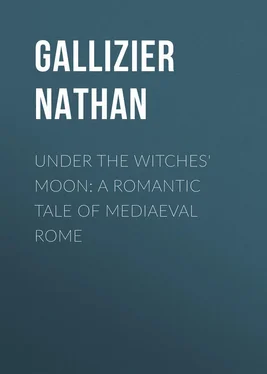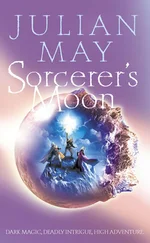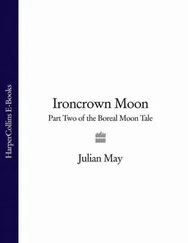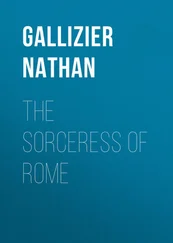Nathan Gallizier - Under the Witches' Moon - A Romantic Tale of Mediaeval Rome
Здесь есть возможность читать онлайн «Nathan Gallizier - Under the Witches' Moon - A Romantic Tale of Mediaeval Rome» — ознакомительный отрывок электронной книги совершенно бесплатно, а после прочтения отрывка купить полную версию. В некоторых случаях можно слушать аудио, скачать через торрент в формате fb2 и присутствует краткое содержание. Издательство: Иностранный паблик, Жанр: foreign_antique, foreign_prose, на английском языке. Описание произведения, (предисловие) а так же отзывы посетителей доступны на портале библиотеки ЛибКат.
- Название:Under the Witches' Moon: A Romantic Tale of Mediaeval Rome
- Автор:
- Издательство:Иностранный паблик
- Жанр:
- Год:неизвестен
- ISBN:нет данных
- Рейтинг книги:4 / 5. Голосов: 1
-
Избранное:Добавить в избранное
- Отзывы:
-
Ваша оценка:
- 80
- 1
- 2
- 3
- 4
- 5
Under the Witches' Moon: A Romantic Tale of Mediaeval Rome: краткое содержание, описание и аннотация
Предлагаем к чтению аннотацию, описание, краткое содержание или предисловие (зависит от того, что написал сам автор книги «Under the Witches' Moon: A Romantic Tale of Mediaeval Rome»). Если вы не нашли необходимую информацию о книге — напишите в комментариях, мы постараемся отыскать её.
Under the Witches' Moon: A Romantic Tale of Mediaeval Rome — читать онлайн ознакомительный отрывок
Ниже представлен текст книги, разбитый по страницам. Система сохранения места последней прочитанной страницы, позволяет с удобством читать онлайн бесплатно книгу «Under the Witches' Moon: A Romantic Tale of Mediaeval Rome», без необходимости каждый раз заново искать на чём Вы остановились. Поставьте закладку, и сможете в любой момент перейти на страницу, на которой закончили чтение.
Интервал:
Закладка:
And they knew not the deity to whom those temple columns had been raised, just as he knew not to whose worship those fallen columns had been erected, nor guessed they who had knelt at the holy shrines. And as they sat there, the man and the woman, their eyes probing the depths of living sapphire, they would watch the restless sea-weed that seemed to coil and uncoil like innumerable blue snakes upon a bed of bright blue flames, and the luminous mosses that trembled like blue stars ceaselessly towards the surface that they never, never reached. And down there in the crystal palaces they would fancy that they saw faces as of glancing mermen, even as the lovers of older days had seen passing Tritons and the scaly children of Poseidon.
And again she would croon those sad melancholy songs that came from her lips like faint echoes of Aeolian harps. Now she flung them upon the air in bursts of weird music, to the accompaniment of a breaking wave, songs so passionate and elemental that they seemed the cry of these same radiant waters when churned by the storm into fury. Or they might have been such wailings as spirits imprisoned in old sea caves would utter to the hollow walls, or which the ghosts of ship-wrecked crews might send forth from the rocks where they had perished. Or again they might suggest some earthly passion, love, jealousy, the cry of a longing heart, till the dirge seemed to wear itself out and the soul of the listener seemed to sail out of the tempest into bright and peaceful waters like those that skirted dream-lost Avalon, scarcely rippled by the faint breeze of summer, breaking in long unfurling waves among the rocks at their feet. Thus they used to sit long hours, heart listening to heart, soul clinging to soul, while she bared her throat to the scent-laden breezes that fanned her and looked out on the dazzling horizon – till a lightning flash from the clear azure splintered the dream and broke two lives.
For a long time Tristan gazed about, vainly trying to order his thoughts. Could he but forget! Would but the present engulf the past! —
His adventure at the Church of Santa Maria of the Aventine and his chance meeting with Theodora recurred to him at intervals throughout the day, and he could not but admit that the reports of the woman's beauty were far from exaggerated. Perchance, if the memory of Hellayne had been less firmly rooted in his soul, he, too, might, like many another, have sought solace at the forbidden fount. However, he was resolved to avoid her, for he had seen something in the swift glance she had bestowed upon him that discoursed of matters it behooved him to beware of. And yet he wondered how she had received his denial, she, whom no man had denied before. Then this memory also faded before the exigencies of the hour.
The sun had sunk to rest in a sky of turquoise, crimson and gold, when Tristan found himself standing on the eminence where seven decades later Crescentius, the Senator of Rome, was to build the Church of Santa Maria in Ara Coeli.
Leaning on a broken pillar, Tristan watched the evening light as it spread a veil of ethereal splendor over the Seven Hills and there came to him a strange feeling of remoteness as to one standing upon some hill-set shrine.
Far beneath him lay the Forum. White columns shone roseate in the dying light of day.
Wrapt in deep thoughts and meditations, Tristan descended the stairs leading from the summit whence in after time the name of Santa Maria in Ara Coeli – Holy Mother at the Altar of Heaven – was to ring in the ears of thousands like a beautiful rhythmic chant, and after a time he found himself in the Piazza fronting the Lateran.
Seized with a sudden impulse he entered the church.
Slowly the worshippers began to assemble. Their numbers increased to almost a hundred, though they seemed but as so many shadows in the vast nave. There was something in their faces, touched by the uncertain glimmer of the tapers and lamps, that filled him with awe, as if he were standing among the ghosts of the past.
At last the holy office commenced.
A very old priest, whose features Tristan could not distinguish, began to chant the Introitus, in deep long drawn notes. Through the narrow windows filtered the light of the rising moon. It did little more than stain the dusk. Over the sombre high altar hung the white ivory figure of the Christ, bowed, sagged, in the last agony. A few blood-red poppies were the only flowers upon the altar. The fumes of incense rose in spiral columns to the vaulted ceiling.
The Kyrie had been chanted, the Gloria in Excelsis Deo. Later the Host was consecrated and the cup before the kneeling worshippers, and the priest was turning to those near him who, as was still the custom in those days, were present to communicate in both kinds.
To each came from his lips the solemn words:
"Corpus Domini Nostri Jesu Christi custodiat animam tuam ad Vitam aeternam!"
He dipped his fingers in the cup, cleansing them with a little wine. He consumed the cleansings and turned to read the antiphony with resonant voice.
"I saw the heavens opened and Jesus at the right hand of God. Lord Jesus receive their spirit and lay not this sin to their charge!"
Then, with hands folded over his breast, he moved towards the altar in the centre, touched it with his lips, and, turning once more to the people, said:
"Dominus Vobiscum!"
"Et cum spiritu tuo," was not answered.
For at that moment rough shouts were heard and through a side door, near a chapel, a body of ruffians rushed into the Basilica, their faces vizored and masked.
With shouts and oaths they made their way towards the altar. The worshippers scattered, the mail-clad ruffians smiting their way through their kneeling ranks up to the altar where stood the form of a youth clad in pontifical vestments, pale but calm in the face of the impending storm.
It was Pope John XI., held prisoner in the Lateran by Alberic, the Senator of Rome. Tristan had not noted his presence during the ceremony. Now, like a revelation, the import of the scene flashed upon his mind.
Bearing Tristan down by the sheer weight of their numbers, they rushed upon the Pontiff, stripped him of his pallium and chasuble, leaving him but one sacred vestment, the white albe.
Unable to reach the Pontiff's side, unable to aid him, Tristan stood rooted to the spot, an impotent witness of the most heinous sacrilege his mind could picture, almost turned to stone.
Before Tristan's very eyes, before the eyes of the worshippers, who outnumbered the ruffians ten to one, an outrage was being committed at which the fiends themselves would shudder. Violence was being done to the Father of Christendom in his own city, and the craven cowards had but their own safety in mind.
Just what happened Tristan could not immediately remember. For, as he rushed towards the spot where he saw the Pontiff struggling helplessly against his assailants, he was violently thrust back and the ruffians made their way towards a side chapel with their captive. Thus he found himself helplessly borne along in the darkness, and thrust out into the night. Tristan fell beneath their feet and was for a moment so utterly stunned that he could not rise.
As in a dream he heard the leader of the band give a command to his followers. They mounted their steeds which were tethered outside and tramped away into the night.
The sudden appearance of an armed band in the sacred precincts of the Lateran had so terrified and cowed the crowd of worshippers that even when the doors of the Basilica were left unguarded, not one ventured to give assistance. Like shadows they fled into the night.
When Tristan regained some sort of consciousness he looked about in vain for aid.
Dimly he remembered that the ruffians were mounted, and by the time he summoned succor they would have stowed their captive safely away in one of their castellated fortresses, where one might search for him in vain forever more.
Читать дальшеИнтервал:
Закладка:
Похожие книги на «Under the Witches' Moon: A Romantic Tale of Mediaeval Rome»
Представляем Вашему вниманию похожие книги на «Under the Witches' Moon: A Romantic Tale of Mediaeval Rome» списком для выбора. Мы отобрали схожую по названию и смыслу литературу в надежде предоставить читателям больше вариантов отыскать новые, интересные, ещё непрочитанные произведения.
Обсуждение, отзывы о книге «Under the Witches' Moon: A Romantic Tale of Mediaeval Rome» и просто собственные мнения читателей. Оставьте ваши комментарии, напишите, что Вы думаете о произведении, его смысле или главных героях. Укажите что конкретно понравилось, а что нет, и почему Вы так считаете.












